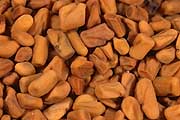
Fenugreek, Trigonella foenum-graecum L., is an erect annual herb native to southern Europe and Asia. Today, it grows today in many parts of the world, including India, northern Africa, and the United States. The plant reaches a height of 0.3 to 0.8 meters and has trifoliate leaves. White flowers appear in early summer and develop into long, slender, yellow-brown pods.
Fenugreek seeds are hard, yellowish brown and angular, with a side of about 3mm (1/8?). These seed may benefit people suffered from various conditions such as wounds, abscesses, arthritis, bronchitis, and digestive problems. In ancient China, herbalists used it for problems of kidney and male reproductive tracts. [1] People may roast the seeds or store them as dried seeds.
FENUGREEK BENEFITS
Fenugreek seeds are rich source of trigonelline, lysine and l-tryptophan and they also contain a large about of steroidal saponins and fibers. These two elements are thought to account for many benefits of fenugreek. The steroidal saponins may inhibit cholesterol absorption and synthesis while fiber is thought to help lower sugar levels [2,3]. Studies have shown that fenugreek helped lower cholesterol, blood sugar levels in patients suffered from diabetes. [4-10].
FENUGREEK SIDE EFFECTS
Fenugreek appears to be safe at low doses. High doses of fenugreek seeds may cause gastro-intestinal disturbance and nausea. Fenugreek may stimulate uterine, pregnant women should avoid fenugreek. [11]
RESEARCH FINDS
ANTI-OXIDANT ACTIVITIES
A study has demonstrated the potent antioxidant properties of the fenugreek seeds. In the study, scientists evaluated the protective effect of polyphenol-rich extract from the seeds of fenugreek against hydrogen peroxide(H202)-induced oxidation in normal and diabetic human erythrocytes (RBCs). The inhibition of lipid peroxidation was concentration-dependent up to 100 microl of extract (0.75mM gallic acid equivalent (GAE) of phenolic compounds). [15]
HYPOGLYCAEMIC ACTIVITIES
A study of alloxan-induced diabetic mice has shown that the hypoglycaemic activity of dialysed fenugreek seed extract was comparable to that of insulin (1.5 U kg(-1)). Fenugreek seed extract also improved intraperitoneal glucose tolerance in normal mice. In a cell study, Indian researchers found that activation of an insulin signal pathway in adipocytes and liver cells was involved in the hypoglycaemic activities of fenugreek seed extract. [12]
BODY WEIGHT
Japanese researchers found that fenugreek seed extract reduced the body weight gain induced by a high-fat diet in obese mice. The extract decreased plasma triglyceride gain induced by oil administration. The major component of the extract, 4-hydroxyisoleucine, also decreased plasma triglyceride gain. [13]
CANCER
Researchers at United Arab Emirates University have shown a potential protective effect of Fenugreek seeds against 7,12- DMBA-induced breast cancer in rats. At 200 mg/kg b.wt., Fenugreek seeds' extract significantly inhibited the DMBA-induced mammary hyperplasia and decreased its incidence. Epidemiological studies also implicate apoptosis as a mechanism that might mediate the Fenugreek's anti-breast cancer protective effects. [14]
LIPID LOWERING
A study has demonstrated that supplementation of fenugreek leaves lowered the lipid profile in STZ-induced diabetic rats. [16]
RESEARCH REVIEW ARTICLES
What do herbalists suggest to diabetic patients in order to improve glycemic control? Evaluation of scientific evidence and potential risks. Acta Diabetol. 2004 Sep;41(3):91-8. Authors: Cicero AF Derosa G Gaddi A Institute: University of Bologna, Italy.
In the course of 12 continuing education seminars given in different regions in Italy in 2001, the researchers distributed a questionnaire to all the attending herbalists asking information about the herbal remedy and dietary supplement they mainly recommended to patients who required a "natural" treatment to control glycemia. They distributed 720 questionnaires and they received 685 completed ones. The 10 more frequently suggested herbal remedies were gymnema, psyllium, fenugreek, bilberry, garlic, Chinese ginseng, dandelion, burdock, prickly pear cactus, and bitter melon. The 10 most frequently recommended dietary supplements were biotin, vanadium, chromium, vitamin B6, vitamin C, vitamin E, zinc, selenium, alpha-lipoic acid, and fructooligosaccharides.
Herbs for serum cholesterol reduction: a systematic view. J Fam Pract. 2003 Jun;52(6):468-78. Authors Thompson Coon JS Ernst E Institute Universities of Exeter and Plymouth United Kingdom
A systematic review of randomized clinical trials of herbal medicinal products used to lower serum cholesterol. Systematic literature searches were conducted in 6 electronic data-bases. The reference lists of all papers and our files were searched for more relevant publications. Experts in the field and manufacturers of identified herbal medicinal products were contacted for published and unpublished data. No language restrictions were imposed. RESULTS: Twenty-five randomized clinical trials involving 11 herbal medicinal products were identified. Guggul (Commiphora mukul), fenugreek (Trigonella foenum-graecum), red yeast rice, and artichoke (Cynara scolymus) have been most extensively studied and have demonstrated reductions in total serum cholesterol levels of between10% and 33%. The methodological quality as assessed by the Jadad score was less than 3 (maximum, 5) for 13 of the 25 trials.
Alternative therapies: Part II. Congestive heart failure and hypercholesterolemia. Am Fam Physician. 2000 Sep 15;62(6):1325-30. Authors Morelli V and Zoorob RJ Institute Louisiana State University School of Medicine in New Orleans, USA
Clinical trials using Q10 for the management of congestive heart failure have had conflicting results; hawthorn is prescribed in Germany for the treatment of this condition, but no trials have been conducted in the United States. Although initial research about the use of garlic in the management of hypercholesterolemia was encouraging, follow-up studies have failed to verify these results. Substituting soy protein for high-fat animal protein diets, however, does have a beneficial effect on serum lipid levels. While, fenugreek may offer modest improvement.


No comments:
Post a Comment